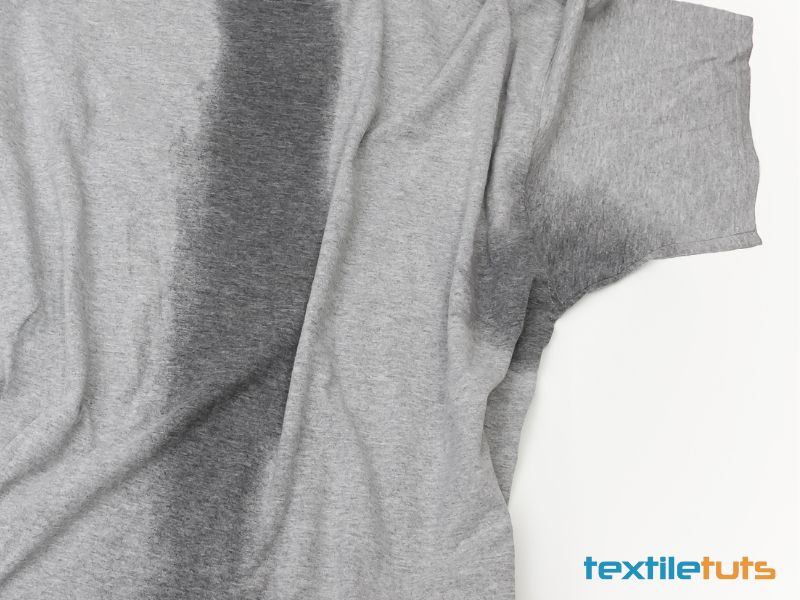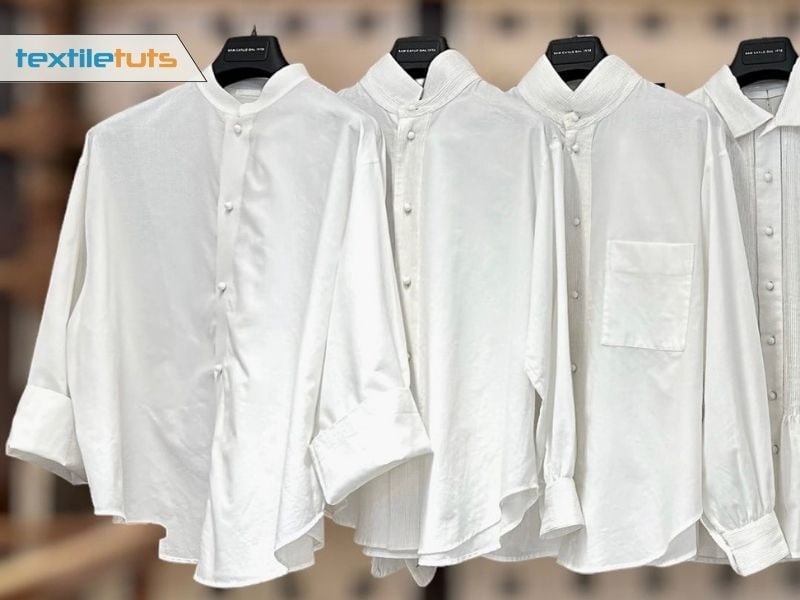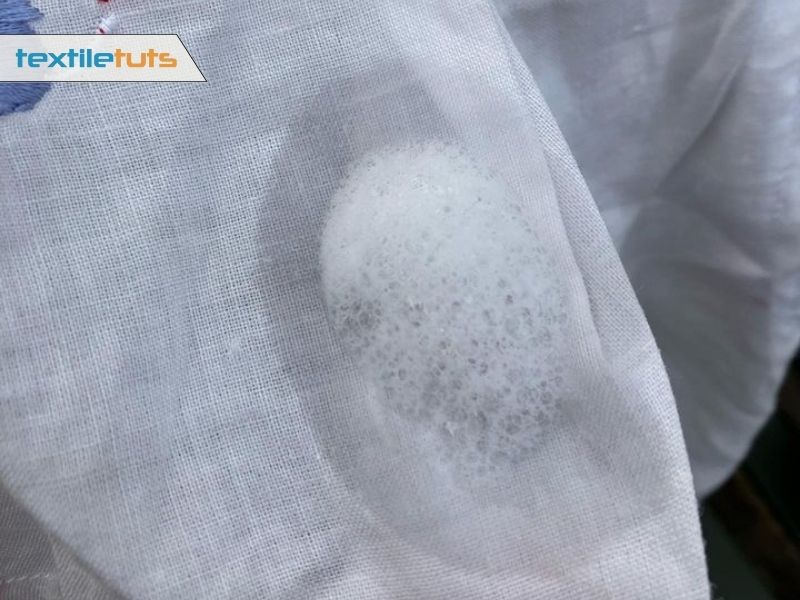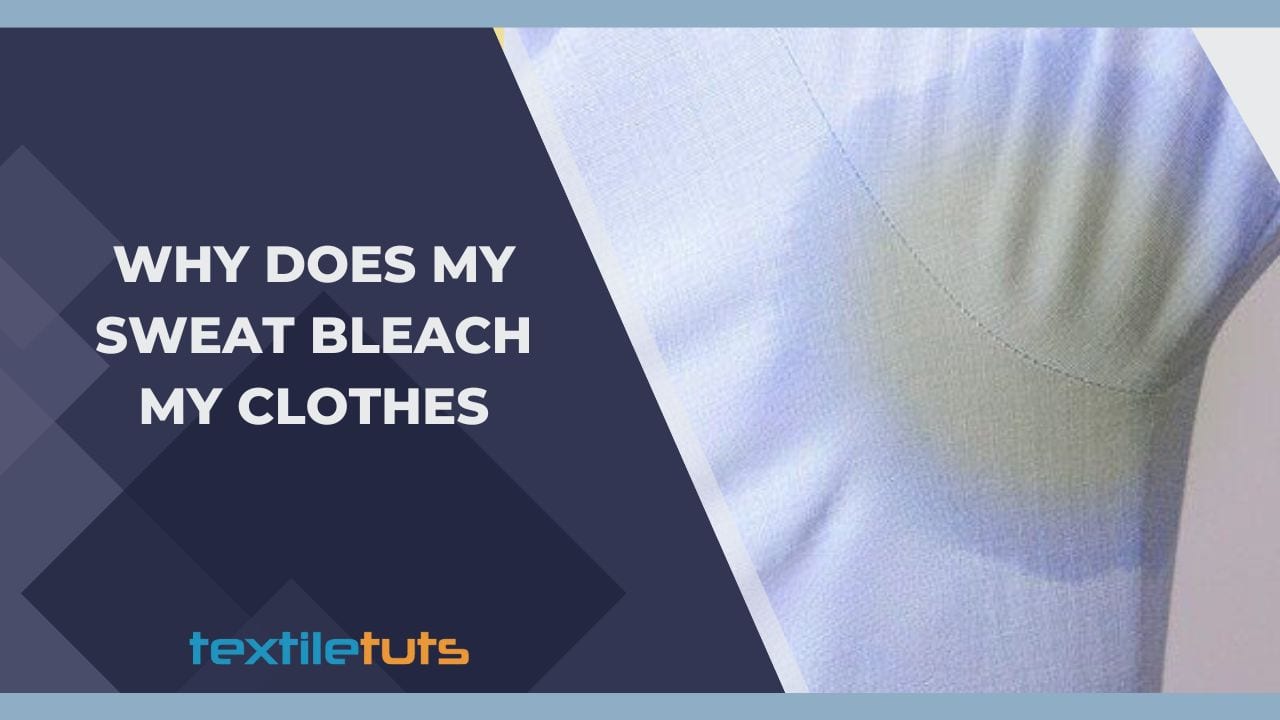Why Does My Sweat Bleach My Clothes?
There are a few reasons why your sweat might be bleaching your clothes. It could be that you are sweating more than usual, or it is more acidic than normal. You might also be using a new detergent that is not compatible with this.
Whatever the reason, it’s essential to figure out why it’s happening so you can prevent it in the future. If you’re not sure why this is bleaching your clothes, you should talk to a doctor or dermatologist to find out more. In this article, we’ll explore some of the reasons why this might be bleaching your clothes. We’ll also provide some tips on how to prevent it from happening in the future.
The Science Behind Why Your Sweat Might Be Bleaching Your Clothes
Sweat is mostly water, with small amounts of salt, electrolytes, and urea. Urea is a waste product that’s produced when your body breaks down protein. It’s what gives its slightly acidic smell.

Sweat doesn’t usually cause discoloration on its own. However, its substances can interact with other materials, like fabric, to cause staining or bleaching. Here’s a closer look at why this might happen.
When it comes into contact with clothing, it can cause the fabric to be yellow. This is because sweat contains urea, which reacts with the fibers in the fabric and causes them to break down over time. The more urea that’s present in perspire, the more likely it is to cause yellowing.
It can also bleach the fabric. This is because it contains salt, which is a corrosive substance. When salt comes into contact with the material, it can break down the fibers and cause them to lose their color. In some cases, sweat can even eat through the fabric.
Who Gets White Sweat Stains?
There are a few different types of people who are more likely to get white sweat stains on their clothing.
Sportsman
They are more likely to get white sweat stains because they tend to sweat more. People with extra-salty sweat are also more likely to get them. People with certain health conditions, such as diabetes or hyperhidrosis, may also be more likely to get white sweat stains.
People with Excessively Salty Sweat
People with extra-salty sweat are more likely to get white sweat stains because the salt in their sweat can cause the stains. People with certain health conditions, such as diabetes or hyperhidrosis, may also be more likely to get white sweat stains.
People with Specific Health Issues
People with certain health conditions, such as diabetes or hyperhidrosis, may be more likely to get white sweat stains. These conditions can cause the body to produce more sweat, which can lead to stains.
What Causes White Sweat Stains?
There are two main reasons perspiration can cause bleaching: the type of fabric. Certain fabrics, like polyester and nylon, are more likely to bleed when they come into contact with it. And, believe it or not, there are two types of sweat:
ECCRINE Sweat
The most frequent form of sweat is eccrine, which comes from the eccrine glands dispersed all over the body. This sort of perspiring is mostly water and salt and is utilized to keep your body temperature constant.
Apocrine Sweat
This is produced by the apocrine glands, which are located in areas like the armpits and groin. This type of perspiring is richer in fats and proteins, which can cause staining and bleaching.
How to Prevent Your Sweat from Damaging Your Clothes?

There are a few things you can do to prevent your sweat from damaging your clothes:
Choose Fabrics Wisely
Natural fibers like cotton and linen are more absorbent than synthetic fibers like polyester and nylon. This means they’re less likely to show sweat stains.
Use a Sweat Guard
This is a piece of fabric that you can put between your skin and your clothing to absorb sweat and prevent it from coming into contact with your clothes.
Wear Loose-Fitting, Breathable Clothing
Tight-fitting clothing will trap sweat against your skin, making it more likely to bleed through to your clothing. Instead, wear loose-fitting, breathable clothing made from natural fibers like cotton or linen. These materials will absorb it and allow your skin to breathe.
Use an Antiperspirant
Antiperspirants help to reduce sweating by temporarily blocking the pores that release it. This can help to prevent it from staining your clothes.
Change Out of Sweaty Clothes
If you have been sweating, it is essential to change out of these clothes as soon as possible. These clothes will continue to damage your clothing and may cause skin irritation.
Wear Dark Colors
Dark colors are less likely to show sweat stains than light colors because they absorb the light.
Change Your Diet
Meal components that include high amounts of protein can assist decrease the amount of urea produced in your sweat.
Stay Hydrated
Drinking plenty of fluids helps dilute the salt concentration in your Sweat.
Keep Cool
When you’re feeling hot, your body will sweat more to try to cool itself down. So try to stay calm and avoid overheating.
Wash Sweaty Clothes Separately
These clothes should be washed separately from other clothing to prevent them from damaging other items in the wash. Be sure to use a gentle detergent and cool water when washing sweaty clothing.
Why Does This Happen To Some People More Than Others?
A few factors can contribute to why some people’s sweat causes more staining than others.
Salt
The amount of salt in your sweat is one problem. It’s more probable to stain if you have a high level of salt in your perspiration.
Type of Fabric
Another factor is the type of fabric you’re wearing. Certain materials are more absorbent than others, which means that they can hold onto the salty sweat and cause staining.
Body Hair
Finally, if you have a lot of body hair, it can collect on the hair and then drip down onto your clothing, causing staining.
How To Remove White Sweat Stains?
If you do end up with white sweat stains on your clothing, there are a few things you can do to remove them:

Soak the Item in Vinegar
Vinegar is a natural whitener that can help remove sweat stains. Just soak the stained area in a mixture of one part vinegar and two parts water for about 30 minutes.
Use Lemon Juice
Lemon juice is another natural whitener that can be used to remove sweat stains. Simply rub the lemon juice into the stain and let it sit for about an hour before laundering as usual.
Apply Baking Soda
Baking soda is a gentle abrasive that can help loosen and lift sweat stains. Make a paste by mixing equal parts baking soda and water, then apply it to the stain and scrub with a brush. Let it sit for a few minutes before laundering as usual.
Use Hydrogen Peroxide
Hydrogen peroxide is a powerful bleaching agent that can remove even the toughest sweat stains. Just be sure to dilute it with water (1 part hydrogen peroxide to 2 parts water) before applying, and always test it in an inconspicuous area first.
Whether you’re dealing with underarm sweat stains or general body stains, following these tips can help you get rid of them for good. And, with a little bit of prevention, you can help keep them from coming back.
Can Sweat Bleach Clothes and Cause Stains After Washing?
Sweat is one of the common reasons for clothes stains. It contains substances that can react with the fabric and cause discoloration, especially on lighter-colored clothes. Even after washing, sweat can still cause stains if not treated properly. It’s important to pre-treat sweat stains and use the right laundry products to prevent discoloration.
Final Say
Sweat can cause staining or bleaching on clothing due to the presence of urea and salt. If you’re concerned about this happening, be sure to take steps to protect your clothes when you moisture. You can also try using a sweat-resistant fabric treatment to help prevent staining and bleaching.

